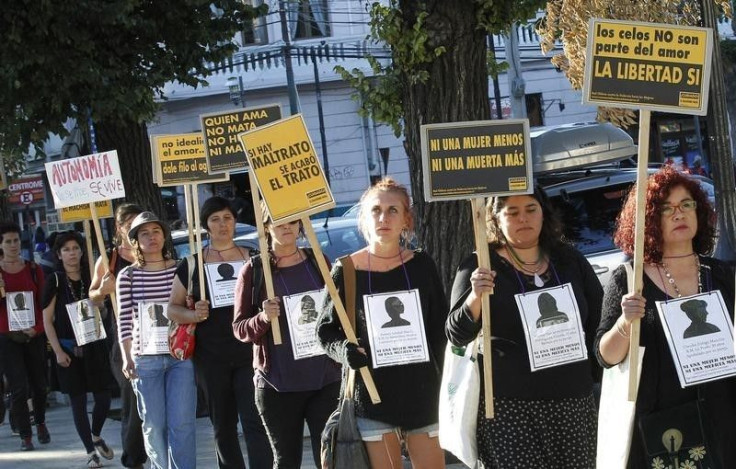Campaign Against Femicides Picks Up Steam In Latin America

Argentineans are gearing up for a march this week to draw attention to violence against women following the murder of a pregnant 14-year-old girl that galvanized widespread outrage. But the campaign isn’t stopping there: Women in Chile and Uruguay are also organizing marches as the movement against femicides -- the killing of women motivated by gender -- spreads across the region.
Demonstrators are set to gather in at least 70 cities across Argentina, as well as Montevideo, Uruguay, and Santiago, Chile, Wednesday as part of the #NiUnaMenos (“Not One Less”) campaign that spread through social media after a spate of high-profile homicides in Argentina.
Last month, Chiara Paez, 14, a pregnant schoolgirl, was found beaten to death and buried in her boyfriend’s backyard in the city of Rufino, in Argentina’s Santa Fe province. Her 16-year-old boyfriend, Manuel Mansilla, confessed to the crime before a judge, although speculation remains over whether he was the sole perpetrator.
Paez’s death followed the murder in Argentina of Maria Eugenia Lanzetti, 44, a kindergarten teacher from Córdoba, who was killed in April when her husband slit her throat in front of her students. Lanzetti had a restraining order against him, and divorce proceedings were pending.
These incidents have helped fuel the #NiUnaMenos campaign. The Argentine women’s rights group La Casa del Encuentro, tallied 1,808 femicides in Argentina from 2008 through 2014, 277 of which occurred last year. Paez’s case reflects a “sick society of machista attitudes, where women continue being seen as a thing to dominate,” director Fabiana Tuñez told Agence France-Presse. Demonstrators will use Wednesday's march to call for stronger implementation of existing laws designed to protect women, comprehensive sex education and the collection by government of official statistics on femicides.
Meanwhile, activist groups in other countries have taken notice and highlighted wider problems with femicide across the region. The Observatory for Gender and Equality, based in Chile, called for a march Wednesday in Santiago, noting 28 Chilean women already have been victims of femicide so far this year. Uruguayan supporters of the campaign also launched a call for demonstrators in several cities Wednesday evening.
A report from the U.N. Economic Commission for Latin America and the Caribbean last year said despite existing laws against femicides in at least 11 Latin American countries, there’s still a dearth of official statistics on crime rates and accountability. But government and NGO figures show alarming numbers: Mexico’s National Citizen Femicide Observatory reported nearly 2,000 femicides a year in Mexico, based on 2012 and 2013 figures. Brazil had nearly twice that number at 4,719 femicides a year, based on 2012 estimates from the Brazilian Center for Latin America Studies.
© Copyright IBTimes 2025. All rights reserved.





















